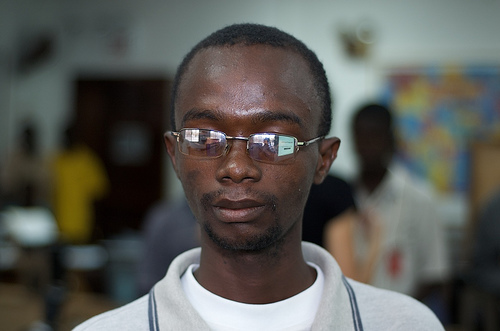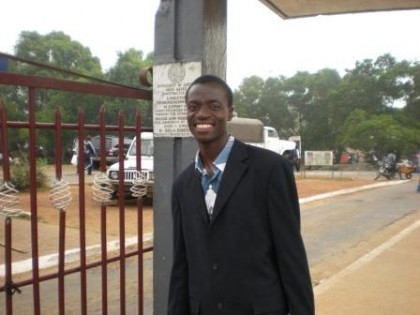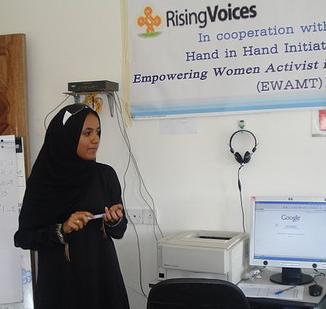Thanks to some recent interviews we can learn more about some of the bloggers of Ceasefire Liberia, a grantee of Rising Voices, and their works.
On 5th of April, 2010 Eduardo Ávila of Rising Voices published an interview with Nat Nyuan-Bayjay, the blog manager of the Ceasefire Liberia Project, who lives in the Liberian capital Monrovia. Nat, a journalist in profession, thinks that the work of the Ceasefire Liberia bloggers is “helping shine a light on some of the social, political, and development problems that Liberia's young population are facing.”
Pocket Cultures, a blog dedicated to provide a guide to world cultures and world blogs, has started interviewing the bloggers of Ceasefire Liberia. On the 6th of April, 2010 they also interviewed Nat. Here are some excerpts from the interview:
How long have you been managing Ceasefire Liberia? What are your greatest achievements with the site?
I’ve been managing CeaseFire Liberia for one year now. My greatest achievements are helping CeaseFire Liberia to let its many readers know about happenings in Liberia via stories I’ve been writing ranging from politics to social and even human-interest and cultural stories, as well as helping to recruit some bloggers for the site who write voluntarily, tirelessly and committedly for the site.
At Ceasefire Liberia you are twelve bloggers in total, but no women. What do you see as the main reasons for that?
It is not that no Liberian female is willing to blog. On the contrary, some of them really want to be a part of the exciting blogging world but are experiencing some hindrances like the lack of gadgets (camera, computer, among others) and have little or no access to internet facilities. Domestic internet is not affordable for the average Liberian and commercial internet is not affordable for most except a few who usually take advantage of such at their respective places of work, affiliation, and so on. A few Liberian women continue to express interest.
On 20th of February, 2010 Eduardo Ávila interviewed Saki Gondalfe, who strongly believes that “the Liberian people continue to make their own history after years of civil war”, and he wants the whole world to know it.
On 7th of April, 2010 Liz published an interview of Saki Tango Golafale at Pocket Cultures:
Where do you live and what do you do when you aren’t blogging?
I live in the Wood Camp community of Paynesville city where I have been for almost four years now.
When I am not blogging, I am involved with many things. I work in a chemistry lab at the University of Liberia, am involved with voluntary community actions that center around environmental protection, and in organizing programs for the chemistry association which I head at the University.
You’re also a poet. What makes you write?
Writing, I think is a basic requirement to survival in this literate world, and this should be the business for every educated man. What a man writes is how he thinks or feels. If I think the world is small, I can reduce that into writing, usually poetic writing, telling someone why I think so.
Are Liberians religious? What are the main religions?
Liberians are religious and since the war, in which religious institutions played a major role, religious institutions have increased their activities. There are a lot of churches and mosques these days.
Read Saki's latest post in Ceasefire Liberia Blog where he tells that “mob justice is a reality in today’s Liberia as civilians lost faith in the justice system of the country.”
On 9th of April Liz at Pocket Cultures published the interview of Boimah JV Boimah, a Liberian journalist and blogger, who lives at Monrovia. Some excerpts:
Could you tell us something about daily life in Liberia?
Daily life in Liberia, I mean Africa’s oldest republic, is difficult as most families here hardly afford a full meal per day. Reportage about corruption in government is high while many rely on hard labor to make a living as unemployment in the formal sector remains high also.
Our staple food here is rice but most families eat other food like cassava, potatoes etc to complement their food desire.
Do you ever feel personally threatened in Liberia these days? Where do the threats come from?
Yes I have receives a series of threats in recent times from government officials who take displeasure in my journalism works. Recently, I was severely beaten by some group of court officials including jurors for taking a photograph while on duty.
Read Boima's article about the clean up campaign at Duala market area in Monrovia.
Also in this month Larry Hardesty of MIT News quoted Ruthie Ackerman, the project leader of Ceasefire Liberia saying:
Ruthie Ackerman, who created the blog Ceasefire Liberia as a bridge between Liberians in Liberia and those in the diaspora — and particularly the large Liberian community in Staten Island — assumed that Liberians in the U.S., with their vastly superior Internet connections, would post updates to the blog more often than their counterparts in Liberia, where Internet service is “virtually nonexistent” outside the capital, Monrovia, and even there, it’s expensive and slow. But the reverse proved to be true. “I think that the reason why is that there’s this sense of urgency in Liberia,” Ackerman said, “that they really want to get their stories out there, and that, if they don’t tell their stories, they won’t be told.”
Here is a previous interview of Ruthie Ackerman by journalist David Wescott. In Ceasefire Liberia blog Ruthie Ackerman writes how a girl's murder sparked riots in Liberia.
Read more articles of Liberian bloggers from the project blog.





